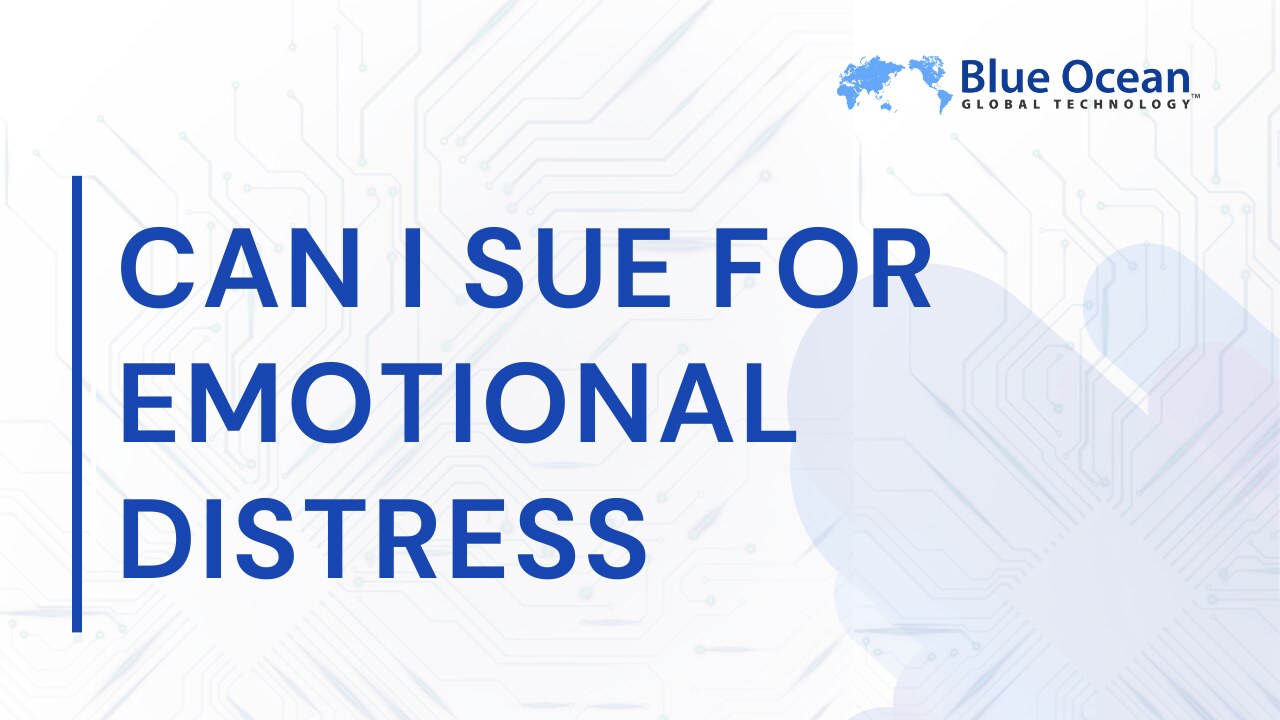Yes, you can sue for emotional distress under certain legal conditions. Emotional distress is caused when someone’s actions take a severe toll on one’s psychology. It is deemed to cause intense suffering. There is one catch. Proving such claims can be challenging as they require substantial evidence. It is also difficult to demonstrate the extent of the distress and how liable the perpetrating party is.
What is Emotional Distress?
Emotional distress is the mental suffering caused when someone acts in an untoward manner. In extreme cases, there might be signs of anxiety, depression, trauma, humiliation, or other psychological harm. It is not necessary that emotional distress will be short-term. It can be long-lasting depending on the impact of the action. It could end up affecting an individual’s quality of life and well-being.
Types of Emotional Distress
There are three primary types of emotional distress claims:
- Intentional Infliction– This takes place when someone deliberately subjects a victim to extreme conduct. The outrageous behavior is intended to cause distress.
- Negligent Infliction– This happens when someone’s careless actions cause severe emotional suffering, even if they did not intend any harm.
- Bystander Lawsuit – This applies when someone witnesses a traumatic event that causes them emotional distress. It could be caused by seeing a loved one get injured due to another’s negligence.

Examples of Emotional Distress
Emotional distress causes the greatest impact in those situations which disrupts someone’s life significantly. For example:
- Severe Car Accident: If a person has been in a major car accident, it may lead to developing PTSD, experiencing flashbacks, and anxiety. The person might not be able to drive anymore.
- False Defamation Case: If someone is falsely accused of a crime or unethical behavior, they may suffer extreme emotional distress. It could damage their reputation, leading to social isolation and depression.
- Medical Malpractice: A patient who experiences a medical error that results in severe emotional suffering. It is caused by misdiagnosis or a surgical mistake. Such people have grounds for a claim.
- Workplace Harassment: An employee at the receiving end of ongoing harassment or discrimination may develop anxiety. They could be rendered incapable of performing their job effectively.
What Counts as Emotional Distress Legally?
In legal terms, emotional distress must be extreme and, hence, provable. Courts often look for the following factors:
- The distress must be more than temporary discomfort.
- Physical troubles like insomnia, headaches, or panic attacks can strengthen the case.
- Medical or psychological evaluations can serve as evidence.
- A clear connection must exist between the defendant’s actions and the distress experienced.
What Emotional Things Can I Sue For?
You can sue for various emotional damages. The following emotional situations call for legal action against the perpetrator.
- Severe anxiety or depression caused by another’s actions
- PTSD resulting from trauma
- Emotional suffering from workplace harassment
- Loss of companionship due to wrongful death
- Psychological harm from false accusations or defamation
Common Emotional Responses
Some symptoms that are looked out for are as follows:
- Mood swings, anger, or frustration
- Social withdrawal or isolation
- Nightmares or flashbacks
- Panic attacks or heightened stress
- Inability to focus on daily tasks

Is It Hard to Sue for Emotional Distress?
Yes, proving emotional distress can be difficult. This is because it is intangible. While it is easier to study physical injuries, psychological harm lacks visible evidence. This is why proper evidence plays an important role along with strong supporting documentation. Legal requirements vary from place to place, and courts often impose high standards for proving distress claims depending on the jurisdiction.
How to Prove Emotional Distress in Court?
To strengthen an emotional distress lawsuit, consider the following evidence:
- Medical records: Treatment history from psychologists and or any resultant diagnosis.
- Testimonies: Statements from witnesses, family, or coworkers.
- Expert opinions: Psychologists or medical professionals can validate claims.
- Personal documentation: Journals, emails, or messages showing distress.
Start Your Emotional Distress Claim Today
Don’t wait to assert your rights. If you’ve suffered severe emotional trauma due to someone else’s actions, contact us now for a private legal consultation.
How Can I Sue for Emotional Distress?
You can sue for emotional distress by taking help from a legal expert. They will first study your case, assess it, and provide guidance accordingly. It is also important to collect medical records, witness testimonies, and any proof of distress. Identify which type of emotional distress you are suing for, whether it is for intentional inflection, negligent inflection, or a bystander lawsuit. An expert will be able to help in this identification.
The attorney helps file the claim and they present necessary evidence in court. A testimony could be required. There must be sufficient documentation supporting the case. While suing for emotional distress is possible, it requires strong legal guidance to achieve a successful outcome.

Frequently Asked Questions
1. How do you prove you have emotional distress?
To prove that you have emotional distress, you will need medical records. It could include records and statements by a therapist and witness. You might need to show how the distress affects you in day-to-day life.
2. How do you claim emotional distress?
You can file a lawsuit based on negligence or intentional harm. You need to provide proof of distress and how exactly it has affected you.
3. How much can I sue for emotional distress?
The amount you can get as compensation for emotional distress varies. It depends on severity and jurisdiction. It could be anything from thousands to millions of dollars in extreme cases.
4. What are examples of emotional distress?
Examples are anxiety, depression, PTSD, insomnia, or physical symptoms caused by severe stress. These symptoms often appear due to harassment, accidents, or trauma.
5. Can I sue a family member for emotional distress?
Yes, you can sue a family member for emotional distress. However, you need to prove that their actions were extreme and intentional.
Considering a Lawsuit for Emotional Distress?
Emotional harm can be just as damaging as physical injury. Speak with our legal team to find out if you have grounds for a claim and what compensation you may be entitled to.













